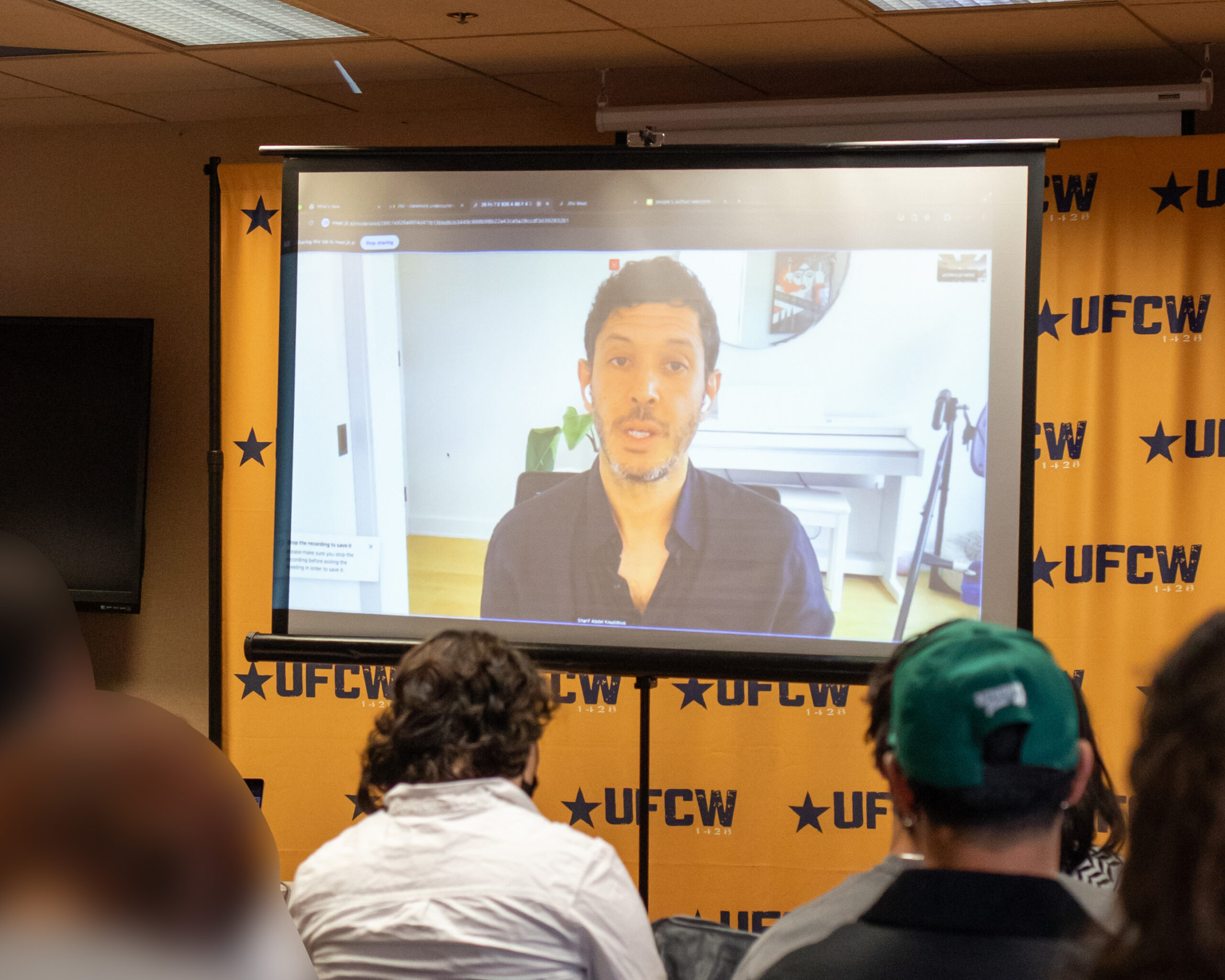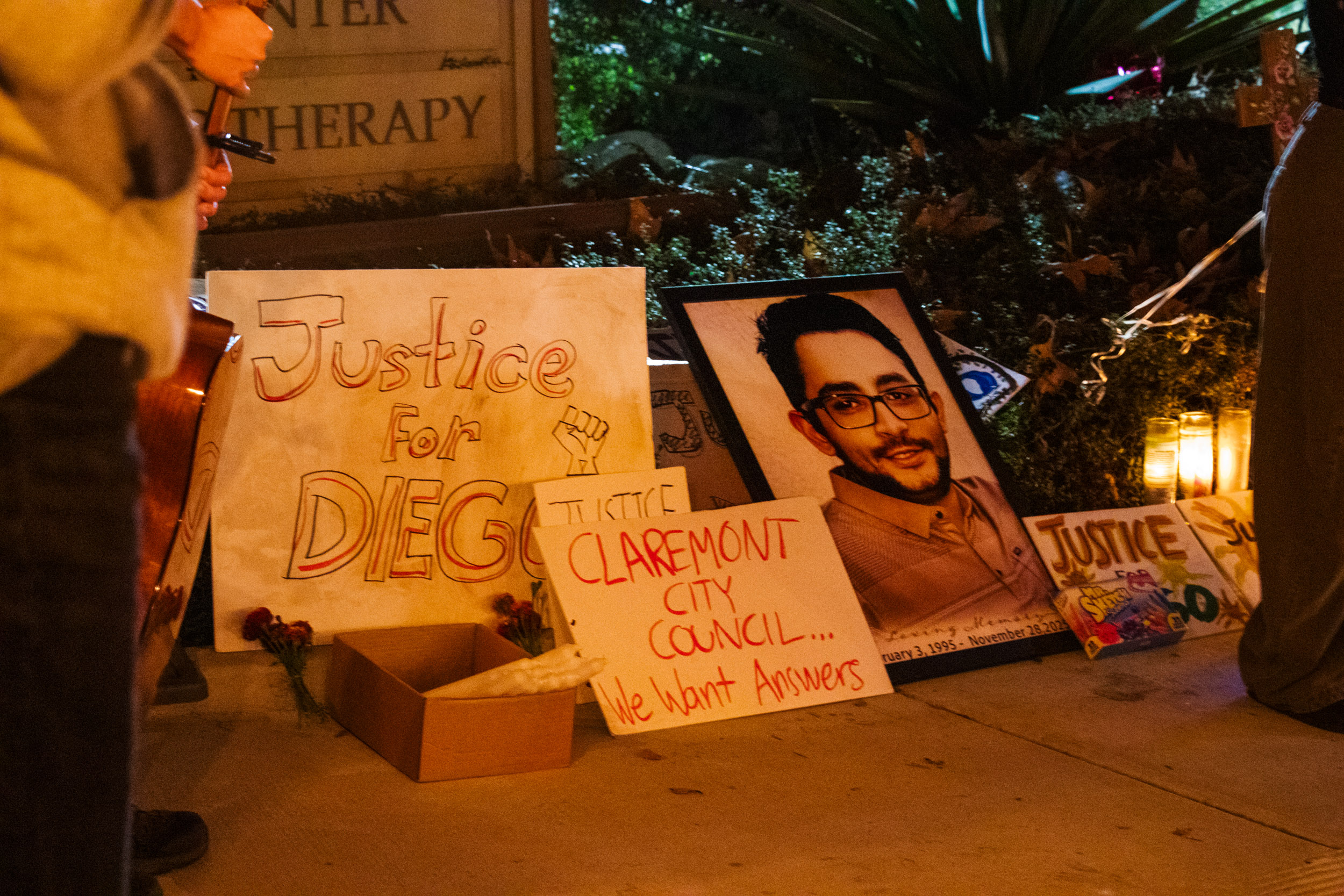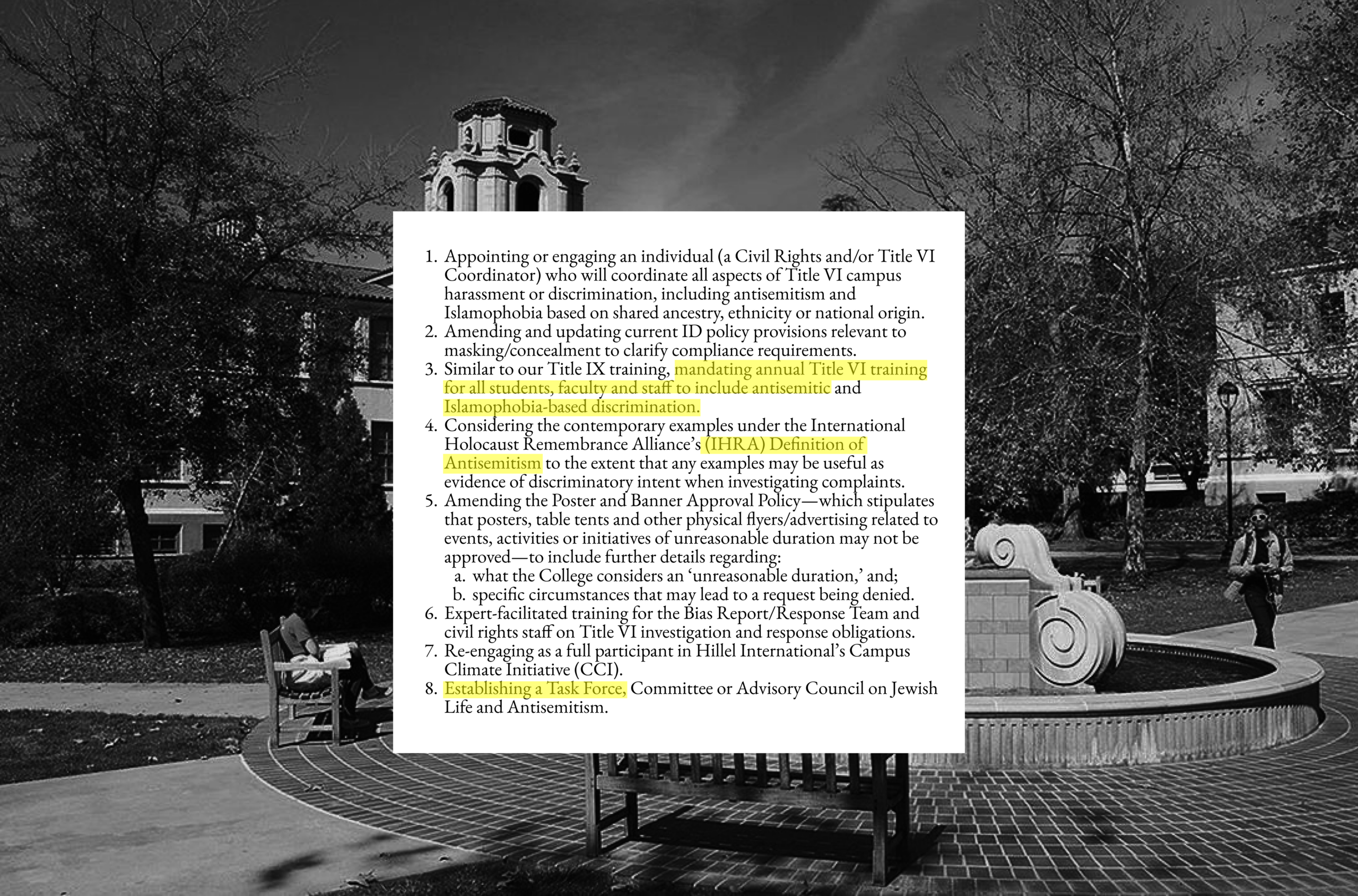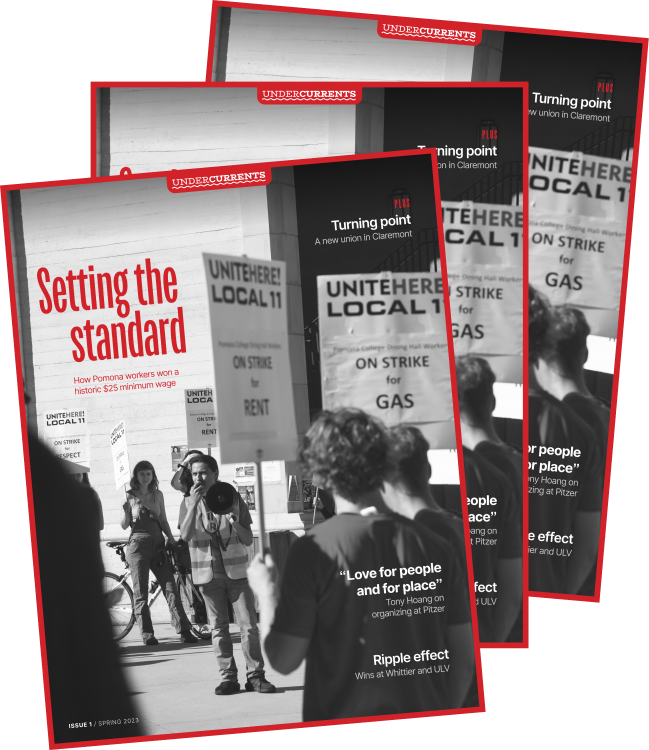
June 11, 2025
The Drop Site News editor spoke about the conditions of reporting in Gaza, and how English-language journalists can work towards the liberation of Palestine, in his opening address at Undercurrents’ People’s Journalism School.

This is a transcript of Sharif Abdel Kouddous’ opening remarks at the People’s Journalism School, hosted by Undercurrents in Claremont, CA, on April 27, 2025. It has been lightly edited for clarity.
Undercurrents: Sharif is Drop Site News’ editor for the Middle East and North Africa, based in New York and Cairo. He has reported from across the Arab world, including from Egypt, Palestine, Syria, Libya, Yemen, Iraq, Bahrain, and Algeria, as well as from across the United States and internationally. Please give a warm welcome to Sharif.
Sharif Abdel Kouddous: Thanks everyone. It’s an honor to be here. Thank you for inviting me to speak at People’s Journalism School as part of Palestine Liberation Week.
I’m speaking to you at a time when both Palestine and journalism are coming under the most violent assault we’ve seen in generations.
In Gaza, genocide is being carried out before us, on display for the world to see. In the West Bank and Jerusalem, displacement, dispossession and apartheid are at full throttle. In 48, the crushing of any and all voices has ramped up. And in the refugee camps, in the diaspora, there’s furthering despair. So this is the ongoing Nakba of Palestine, the accelerating Nakba, the omnipresent Nakba.
As for the assault on journalism, never have so many reporters become martyrs, and I use that term with all intention. Over 211 Palestinian journalists have been killed. They’ve been burned alive. They’ve been decapitated. They’ve been taunted and targeted, assassinated, martyred. And that’s not to mention the journalists who have been wounded, the journalists imprisoned, the journalists who had to make the impossible decision to leave Gaza because life was no longer sustainable.
I believe that independent journalism, and by that I mean journalism that is practiced in a way that is a form of resistance to power; this form of journalism is inextricably linked to Palestine, to how we cover Palestine, to how we talk about Palestine, to how we write and think about Palestine.
None of us can be liberated until Palestine is free, and history cannot move forward, empires cannot be dismantled until Palestine is free. I think there’s an understanding of this around the world, and especially across the global south. There’s a reason people take to the streets all around the world. It’s an understanding that Palestine is a cause for universal liberation, that there can be no justice without justice in Palestine.
“None of us can be liberated until Palestine is free, and history cannot move forward, empires cannot be dismantled until Palestine is free.”
And so it is with journalism. Journalism can either be the sword or the shield. And how we cover Palestine directly speaks to that.
As we heard, I currently work at Drop Site News where I’m a journalist and the Middle East, North Africa editor. In that capacity, over the past eight months, I’ve had the honor of working with journalists in Gaza and other parts of Palestine on a regular basis, on almost daily basis, speaking with them, staying in touch with them, agreeing on what stories to cover and how, editing them, sometimes translating them and publishing them ultimately.
These journalists are working under the most dangerous and difficult conditions of any journalists anywhere in recent history. They’ve been witness to untold death and suffering. They’ve all been displaced multiple times. They’re all hungry. They have all buried friends and family. They have all buried the journalist colleagues. They are constantly being threatened.
“These journalists are working under the most dangerous and difficult conditions of any journalists anywhere in recent history … They have all buried friends and family. They have all buried the journalist colleagues.”
Israel has targeted journalists to such a degree that regular people in Gaza now are afraid to live close to journalists in the same building or in a tent nearby. They literally ask journalists to move away from them because they’re afraid of being bombed next to them. This is what it’s come to.
Hossam Shabat was a 23-year-old journalist who was one of the few reporters who didn’t leave Northern Gaza throughout the entirety of the genocide. This past October, the Israeli military labeled him and five other journalists with Al Jazeera Mubasher as terrorists, and essentially put them on a hit list.
On March 24, Israel bombed the car that Hossam was driving in in Beit Lahiya. They blew his legs off his body, and they killed him deliberately. They assassinated him. And they repeated afterwards that he was a terrorist. And they wrote, “Don’t let the press vest fool you.”
Just hours before that, Hossam and I were exchanging text messages. He had just filed a story and was asking when it would be published, and I was telling him I would translate and edit it soon. He was joking around with me and telling me that he would preemptively publish it on his own in Arabic.
I slept for a few hours, and when I woke up, I continued to message him. I didn’t know that he was already dead. Did his phone go off in his pocket as he was lying dead on the ground? Was my message vibrating on his dead body? Could I have done anything more to protect him? How could I have helped keep him alive? Will we ever get justice for him?
“Was my message vibrating on his dead body? … Will we ever get justice for him?”
These questions will never leave me, but what we can do is to honor Hossam, and so many journalists like him that have been killed in Gaza. We can honor them by not forgetting them. We can honor them by highlighting their work. We can honor them by fighting for accountability in their killings and to carry on their work and struggle and to keep telling their stories.
We need to tell these stories in the face of a media ecosystem in this country that is essentially hostile to Palestinian journalists in particular, and to Palestinian liberation in general. There is no topic where the coverage by legacy media or the mainstream media in this country is more skewed or more beholden to power than Palestine.
These very same media institutions and some of the people who work for them often portray independent journalists or Palestinian journalists as activist journalists or as not being objective. Now, I’m not gonna get into the issue with these terms … I know what they intend to say when they use these terms. They’re using it as a slur. They’re saying that independent journalists intentionally skew their reporting or are inaccurate to fulfill a political agenda.
Now, this accusation coming from them is completely laughable. It’s nonsense. These media institutions and some of the journalists who work for them have so thoroughly adopted establishment orthodoxy as their own, that they’ve become completely blinded to it, like what water is to fish.
“These media institutions and some of the journalists who work for them have so thoroughly adopted establishment orthodoxy as their own, that they’ve become completely blinded to it, like what water is to fish.”
There are too many examples to enumerate, but let me just give you one. There’s a headline from the New York Times in November 2023—so relatively early on in the genocide. The Israeli military had just bombed the Jabalia refugee camp yet again, killing somewhere around 50 or 60 people and wounding dozens more. The headline in the New York Times, which is arguably the most powerful newspaper in the world, was “Explosion Gazans say was airstrike leaves many casualties in dense neighborhood.”
So think of the rhetorical gymnastics required to come up with such a headline: the passive voice, the sterile terminology, the lack of urgency, the dismissal of the victims, the sheer linguistic acrobatics, and just frankly the poor writing needed to avoid printing a much more accurate news headline, which would be much simpler and a much closer reflection of what actually happened, which is: “Israel bombs refugee camp, killing dozens of civilians.” That’s the headline.
“Think of the rhetorical gymnastics required to come up with such a headline: the passive voice, the sterile terminology, the lack of urgency, the dismissal of the victims, the sheer linguistic acrobatics, and just frankly the poor writing needed to avoid printing a much more accurate news headline.”
This is just a very simple example and actually a very light one, because it’s just a headline and it doesn’t get into front page major articles with allegations of the systemized use of rape against Israeli civilians, which has a very deep effect on policy on the ground, and which is not backed up by any real journalism and any facts. So they’re the activist journalists, or how they use that term as a slur for bad journalism, even though it really isn’t a slur.
So one of the questions we have to ask is why? Why do legacy media institutions in this country cover Palestine in such a skewed way? They’re not forced to. So why do they choose to?
I think it’s because the span of politics that they cover only goes as far as the political spectrum of Washington. Anything beyond that spectrum is seen as unserious or radical. I mean that in how they see radical as a pejorative term, again even though it really isn’t.
For example, there’s a span of debate in Washington on some issues, mostly social issues — reproductive rights or LGBTQ+ rights or gun rights. The coverage in these institutions will often reflect that. You often see quite good and nuanced coverage of these topics by these media institutions. But there’s probably no topic in Washington where there’s more consensus than Palestine. Both the Democratic and Republican parties completely back Israel. So there’s full consensus in Washington. And this is then reflected in the coverage. The media institutions do not see Palestine, they only see Israel.
“The span of politics that they cover only goes as far as the political spectrum of Washington … probably no topic in Washington where there’s more consensus than Palestine. Both the Democratic and Republican parties completely back Israel … The media institutions do not see Palestine, they only see Israel.”
I don’t mean this as a blanket statement. There are good journalists working at these institutions at major newspapers and TV networks. There are some good articles and programs on Palestine, but I’m talking about the overall editorial line, the overall coverage, the overall effect of that coverage, which is one that acts as a megaphone for power, and one that allows this genocide and Gaza to continue and allows for the slaughter of Palestinian journalists to continue.
“That coverage … acts as a megaphone for power, and one that allows this genocide and Gaza to continue and allows for the slaughter of Palestinian journalists to continue.”
As I mentioned earlier, there can be no justice anywhere without justice in Palestine that none of us can be liberated until Palestine is free. And we are literally seeing this oppression increasingly come home, as it always does, as it always has throughout history.
The colonial violence in the periphery eventually comes back to the imperial core. And Israel’s imperial core is not Tel Aviv, it’s New York and Washington. People in this country are being arrested, they’re being deported. Academic institutions are caving in, civilians are being sent to prison camps in El Salvador, and men and women in masks are snatching people off the street and shoving them into unmarked vans. This happens where I grew up and where I’m from in Egypt, where people know that this happens, but this is happening here now, and it’s all inextricably linked.
But another thing we have to remember is that we can’t be defeated until Palestine is defeated. That’s also true. And Palestine is not defeated. Palestine exists. It fights back. We’re seeing some of the bravest acts of journalism we’ve ever seen. We’re seeing some of the biggest movements in support of Palestine in this country that we’ve ever seen in this country’s history. And these movements are not just anti-occupation as they used to be. They’re anti-Zionist and they’re anti-colonial, and it’s being laid bare. And I think that is why the response is so fierce, because they are in fact losing the narrative. They’ve lost it actually, and the truth has never been laid so bare.
“We can’t be defeated until Palestine is defeated … And Palestine is not defeated. Palestine exists. It fights back.”
Since this is a people’s journalism school, let’s talk a little about how we can think about journalism in Palestine. I think there’s some simple practices that lend themselves to good journalism.
The first is you should be adversarial to power. You should treat statements and claims from officialdom with the utmost skepticism. So when Israel says it did not intentionally bomb something in Gaza, for example, or when it furnishes a so-called document claiming that a Palestinian journalist is actually a militant, one’s first instinct should be to treat it as a lie, not just as evidence that needs to be debunked as a lie.
“When Israel says it did not intentionally bomb something in Gaza … one’s first instinct should be to treat it as a lie, not just as evidence that needs to be debunked as a lie.”
I do not say this as someone who supports Palestinian liberation, I say this as a journalist based on Israel’s long and repeated record of outright lying. So this is how you treat the statement when they say they’re investigating a massacre that they committed, or when they claim they do not target civilians—they don’t get to have these claims repeated verbatim in our coverage unless they furnish some actual evidence or proof to back up their claims.
Too often legacy media will print these claims. It’ll be a paragraph: the Israeli military says so-and-so, even in a relatively strong article that’s got good coverage. And the reason they print them is because they’re official claims coming from an official military or official government spokesperson, and because they’re using this both sides argument, right?
To give a simple analogy to expose the fallacy of this both-sides type of thinking: if two people are sitting in a room and one person says it’s raining, and the other person says it’s not raining, the job of the journalist is not to be a stenographer and print both of those statements. The job of the journalist is to look out the window and expose the person who’s lying. So this skepticism needs to be applied on a much broader and grander scale as well.
“If two people are sitting in a room and one person says it’s raining, and the other person says it’s not raining, the job of the journalist is not to be a stenographer and print both of those statements. The job of the journalist is to look out the window and expose the person who’s lying.”
What I mean is in how we think about the so-called international rules-based order or the liberal order, we need to treat this with a very healthy degree of skepticism. It should not actually be taken seriously anymore. It never should have been. We have to approach it and treat it with extremely critical eyes.
This is not new. I was recently reading an essay by James Baldwin, and this struck me. It was written in 1976. This is what he wrote. “The civilized have created the wretched, quite coldly and deliberately, and do not intend to change the status quo, are responsible for their slaughter and enslavement reign down bombs on defenseless children whenever and wherever they decide that their vital interests are menaced, and think nothing of torturing a man to death. These people are not to be taken seriously when they speak of the sanctity of human life or the conscience of the civilized world.” That could have been written today.
“These people are not to be taken seriously when they speak of the sanctity of human life or the conscience of the civilized world.”
Another basic rule of thumb in journalism, especially in Palestine, is just to listen to people. Listen to the people on the ground, listen to what they’re saying. Listen to the people at the target end of the bombs, amplify their voices. They do not have press offices, they don’t have PR agencies or a pulpit from which to speak. Our role as journalists is to make their voices heard.
And part of that is simply to rely on Palestinian journalists in Gaza. They are still there. They are still reporting. They want to work. They should get paid for that work. We keep hearing how Israel, along with Egypt, has barred international journalists from accessing Gaza. This is true and it’s an assault on press freedom, and they should allow foreign reporters in. But that does not mean that we cannot accurately cover Gaza. The best journalists in the world who can cover Gaza are the Palestinian journalists who live there and are there on the ground. It’s actually not hard to reach them, and it’s not hard to provide a platform for them and to publish them. And we should.
The best journalists in the world who can cover Gaza are the Palestinian journalists who live there and are there on the ground. It’s actually not hard to reach them, and it’s not hard to provide a platform for them and to publish them. And we should.
Another rule is that we have to be extremely rigorous and accurate in our reporting. This is an imperative because coverage of Palestine comes under particular scrutiny and assault, and any mistake will be exploited, will be used to delegitimize you and destroy your credibility. So simple practices like having double sourcing on certain claims, making sure dates and times and testimonies line up, should always be followed.
Coverage of Palestine comes under particular scrutiny and assault, and any mistake will be exploited, will be used to delegitimize you and destroy your credibility.
These are very basic principles, but because the violence of genocide is so overwhelming, it can be tempting to run with anything to try and make an impact. I understand that impulse, but it’s more important to get it right because that’s what holds up in the long run. There is enough horror in the truth of what is happening.
The final thought is that I think the type of institution one works for matters, that the form of our media matters. Who funds it, who runs it, how it operates, how decisions are made. Independent media is so crucial, especially now in the midst of a genocide that the halls of power would like to have you simply accept and look away from.
I have journalist friends who work at legacy media institutions who try and change those institutions from within, who really do try, and they do sometimes make a difference inside these institutions. They do get some great coverage in these important journalistic outlets, and I applaud them for that.
But I think we have reached a point where the editorial position on an institutional level of these media outlets is so corrupt and so nakedly in service of power that we have to reject working for them on principle, writing for them on principle.
There’s a book that just came out by Omar El Akkad, who himself worked as a journalist for many years. It’s titled One Day Everyone Will Have Always Been Against This, where he elucidates on this point.
He writes, “It’s an admirable thing in a politics possessed of a moral floor to believe one can change the system from the inside, that with enough respectful prodding, the establishment can be made to bend like that famous arc toward justice. But when after decades of such thinking decades of respectful prodding, the condition one arrives at is reticent acceptance of genocide, is it not at least worth considering that you are not changing the system nearly as much as the system is changing you?”
“When after decades of such thinking decades of respectful prodding, the condition one arrives at is reticent acceptance of genocide, is it not at least worth considering that you are not changing the system nearly as much as the system is changing you?” Omar El Akkad, One Day Everyone Will Have Always Been Against This
So I read this passage, and I read it now to say that this system, this media system, as it exists in this country, cannot be changed. It needs to be dismantled and replaced. And one way to start doing that is to support independent media institutions donate to them, to work for them, to report for them.
“This media system, as it exists in this country, cannot be changed. It needs to be dismantled and replaced.”
Journalism is such an important part of any struggle for justice. And without it, the fight is practically impossible.
I just want to end with the words of Hossam Shabat. This is from the letter he wrote knowing that he was being hunted by the Israeli military and knowing that he was probably going to be killed, and he gave it to his friends and family to publish after his death, and he ended the letter with these words:
“I ask you now, do not stop speaking about Gaza. Do not let the world look away. Keep fighting, keep telling our stories until Palestine is free.”
Thank you.


Abolition

Commentary

Palestine

Undercurrents reports on labor, Palestine liberation, prison abolition and other community organizing at and around the Claremont Colleges.

Issue 1 / Spring 2023
Setting the Standard
How Pomona workers won a historic $25 minimum wage; a new union in Claremont; Tony Hoang on organizing
Read issue 1